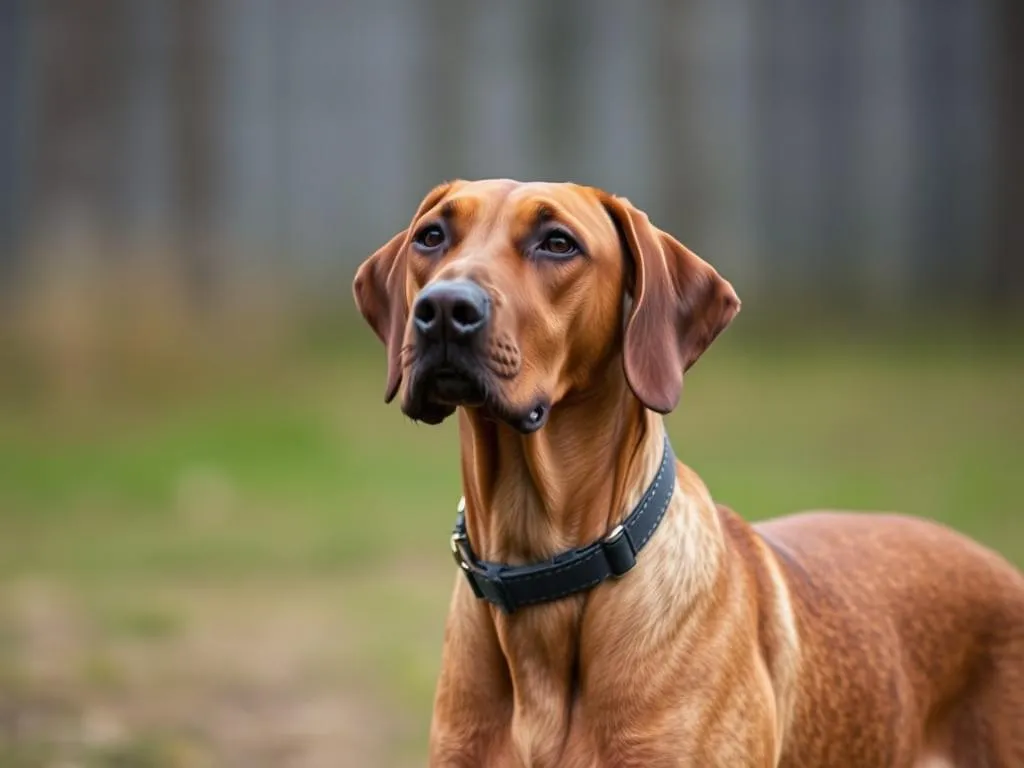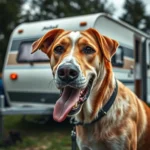
Introduction
The Rhodesian Ridgeback is a captivating breed known for its unique appearance and loyal temperament. Originating from Southern Africa, these dogs were initially bred for hunting lions, showcasing their strength and agility. Understanding the Rhodesian Ridgeback pros and cons is crucial for anyone considering bringing this breed into their home. This article aims to provide a balanced view of the Rhodesian Ridgeback, covering their history, physical characteristics, temperament, and more, helping potential owners make informed decisions.
History of the Rhodesian Ridgeback
Origin and Development
The Rhodesian Ridgeback traces its roots back to the Khoikhoi people of Southern Africa, who bred native dogs with European breeds brought by early settlers. This unique blend resulted in a versatile hunting dog that was particularly skilled in tracking and hunting game, including lions. The breed was initially known as the “African Lion Hound,” reflecting its impressive hunting prowess.
Breed Recognition
The Rhodesian Ridgeback gained recognition in the early 20th century, with formal breed standards established by various kennel clubs. The American Kennel Club (AKC) officially recognized the breed in 1955, while the United Kennel Club (UKC) recognized it earlier. Today, the Rhodesian Ridgeback enjoys popularity as a family pet and is ranked among the top dog breeds in the United States.
Physical Characteristics
Size and Weight
Rhodesian Ridgebacks are large dogs, with males typically standing between 24 to 27 inches tall and weighing between 85 to 100 pounds. Females are slightly smaller, averaging 22 to 25 inches in height and weighing between 70 to 85 pounds. Their robust build and well-defined muscles make them look powerful and elegant.
Coat and Color
These dogs have a short, sleek coat that is easy to maintain. The most common color variations include wheaten and red, with some dogs displaying a darker shade. The coat’s texture is smooth, providing a striking appearance that complements their athletic physique.
Unique Features
One of the most distinctive characteristics of the Rhodesian Ridgeback is the ridge of hair along its back that grows in the opposite direction to the rest of the coat. This unique feature, coupled with their strong, athletic build, makes them easily recognizable and adds to their charm.
Temperament and Behavior
General Temperament
Rhodesian Ridgebacks are known for their loyalty, intelligence, and protective nature. They form strong bonds with their families and can be affectionate companions. However, they also possess an independent streak, which can sometimes manifest as stubbornness.
Socialization Needs
Early socialization is crucial for this breed. Exposure to various people, environments, and other animals helps them develop into well-rounded adults. Rhodesian Ridgebacks are generally good with children, making them suitable family pets, but supervision is essential during interactions with younger kids.
Exercise Requirements
These dogs are energetic and require regular exercise to stay healthy and happy. Daily walks, runs, and playtime are necessary to meet their activity needs. On average, a Rhodesian Ridgeback should have at least 60 to 90 minutes of exercise each day, including a mix of physical and mental stimulation.
Pros of Owning a Rhodesian Ridgeback
Loyalty and Companionship
One of the most significant advantages of owning a Rhodesian Ridgeback is their unwavering loyalty. They form deep bonds with family members, often becoming protective and attentive companions. Their affectionate nature makes them great family pets, as they are known to be gentle and loving with children.
Good Watchdogs
Rhodesian Ridgebacks possess strong protective instincts, making them excellent watchdogs. They are naturally alert and will bark to alert their owners of any unusual activity. This trait provides peace of mind for families, as they can rely on their Ridgeback to safeguard their home.
Low Grooming Needs
Compared to many other breeds, the Rhodesian Ridgeback has low grooming needs. Their short coat sheds minimally, requiring only occasional brushing to remove loose hair. This makes them an appealing option for those who prefer a dog that is relatively low-maintenance in terms of grooming.
Adaptability
Rhodesian Ridgebacks can adapt to various living conditions, whether in a house with a yard or an apartment, as long as they receive adequate exercise. Their adaptability makes them suitable for different lifestyles, though they thrive in environments where they can run and play freely.
Cons of Owning a Rhodesian Ridgeback
Stubbornness
One of the challenges of owning a Rhodesian Ridgeback is their independent and sometimes stubborn nature. This can make training a bit tricky, as they may not always be eager to follow commands. Owners need to be patient and consistent, using positive reinforcement techniques to encourage good behavior.
High Energy Levels
Rhodesian Ridgebacks have high energy levels and require regular exercise. Without sufficient physical activity, they may become bored and develop undesirable behaviors, such as digging or excessive barking. It’s essential for potential owners to commit to providing the necessary daily exercise to keep their Ridgeback happy and well-adjusted.
Potential Health Problems
Like all breeds, Rhodesian Ridgebacks are prone to certain health issues. Common health concerns include hip dysplasia, skin allergies, and certain genetic conditions. Regular veterinary check-ups and a healthy diet are crucial to managing these potential risks and ensuring a long, healthy life for your dog.
Space Requirements
While Rhodesian Ridgebacks can adapt to smaller living environments, they do best in homes with ample space to run and play. Prospective owners should consider their living situation and ensure they can accommodate the breed’s needs for both exercise and space.
Training and Socialization Tips
Basic Training Techniques
Training a Rhodesian Ridgeback requires patience and consistency. Positive reinforcement methods, such as treats and praise, are effective in encouraging desired behaviors. Short, engaging training sessions help maintain their interest and focus, making the learning process enjoyable for both the dog and the owner.
Importance of Socialization
Early socialization is vital for Rhodesian Ridgebacks. Introduce them to various environments, people, and other animals during their formative months to help them develop into well-rounded adults. Puppy classes can be an excellent way to facilitate socialization while providing foundational training.
Dealing with Behavioral Issues
Common behavioral issues, such as excessive barking or digging, can often be addressed through consistent training and increased exercise. If these behaviors persist, consulting a professional dog trainer or behaviorist can provide additional strategies tailored to your dog’s needs.
Health Considerations
Common Health Issues
The Rhodesian Ridgeback is generally a healthy breed, but it’s important to be aware of potential health concerns. Common issues include hip dysplasia, which affects joint development, and skin allergies, which can lead to discomfort and irritation. Regular health screenings can help identify and manage these conditions early.
Regular Health Check-ups
Routine veterinary visits are essential for maintaining your dog’s health. Annual check-ups can help catch potential health issues before they become serious. Vaccinations, dental care, and preventative treatments for parasites are also crucial components of responsible pet ownership.
Nutrition and Diet
A balanced diet is essential for the optimal health of a Rhodesian Ridgeback. High-quality dog food that meets their nutritional needs is recommended, with careful attention to portion sizes to prevent obesity. Consulting with a veterinarian can help tailor a diet plan that suits your dog’s age, weight, and activity level.
Finding a Rhodesian Ridgeback
Reputable Breeders
When searching for a Rhodesian Ridgeback, it’s vital to find a reputable breeder. Responsible breeders prioritize the health and temperament of their dogs and provide proper socialization and health testing. Look for breeders who are knowledgeable about the breed and are willing to answer your questions.
Adoption Options
Adopting a Rhodesian Ridgeback from a shelter or rescue organization can be a rewarding experience. Many dogs in need of homes are available for adoption, and these organizations can provide valuable information about the dog’s history, behavior, and health.
Cost of Ownership
The initial cost of acquiring a Rhodesian Ridgeback can range from several hundred to a few thousand dollars, depending on the breeder or adoption organization. In addition to the purchase or adoption fee, prospective owners should consider ongoing expenses such as food, grooming, veterinary care, and training.
Conclusion
Owning a Rhodesian Ridgeback can be a fulfilling experience, characterized by their loyalty, intelligence, and adaptability. However, potential owners must weigh the Rhodesian Ridgeback pros and cons carefully. Their stubbornness, high energy levels, and space requirements can pose challenges, but with the right commitment and training, they can thrive as beloved family members. Consider your lifestyle and environment to determine if this remarkable breed aligns with your family’s needs and capabilities.









